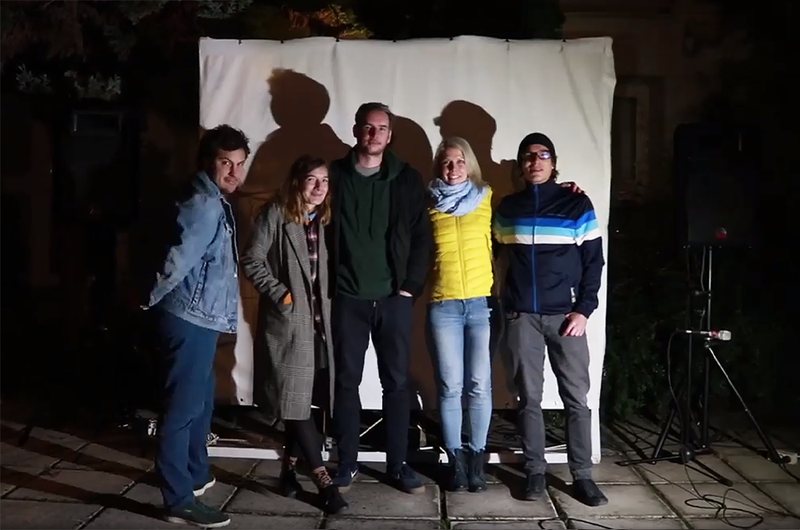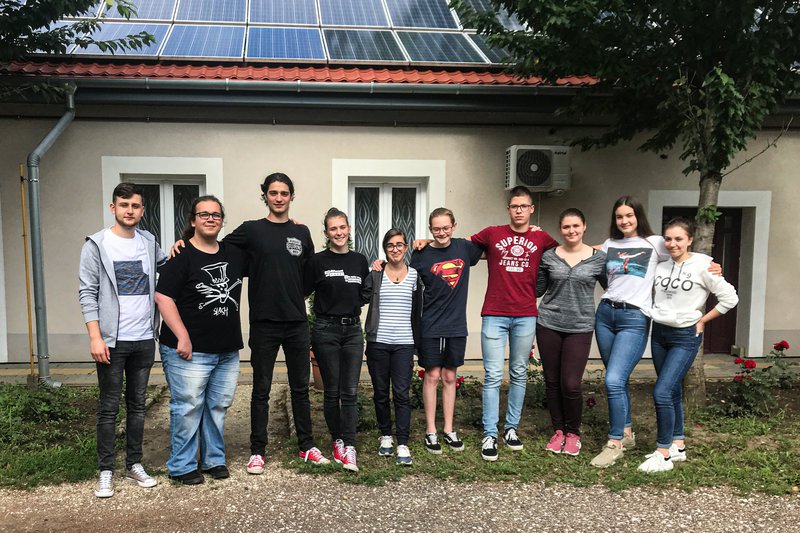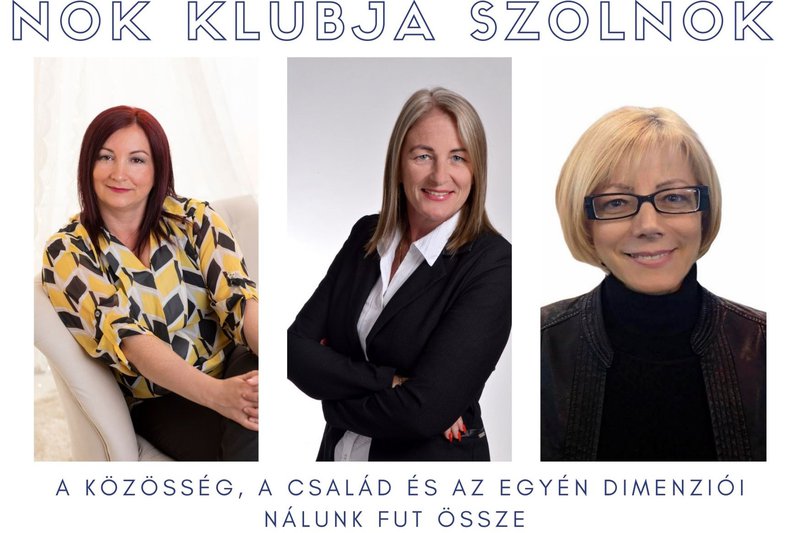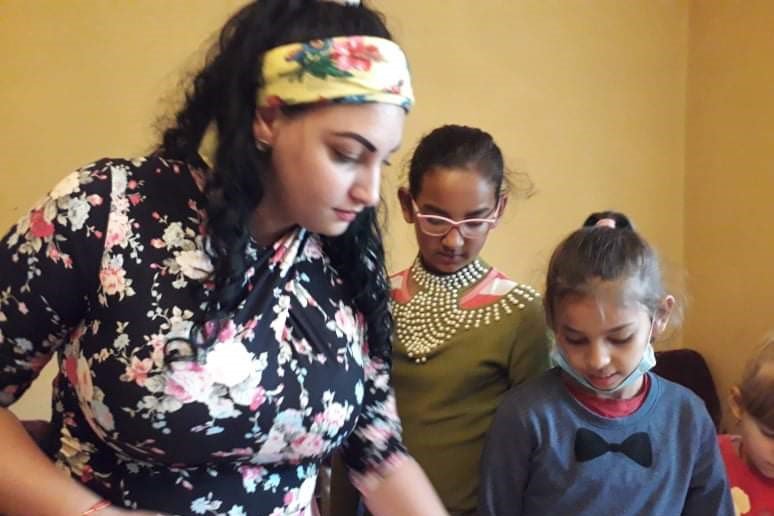Cooperation partners
Alternative Communities Association (AKE) is a 20-year-old organization based in Debrecen. Our aim is to transform the youth, our main target group, into a creative community by providing them an open space where they can create and share values, knowledge, and culture.
We also work as an incubator for local civic organizations and the biggest project we are currently overseeing is a regranting project in the region supported by the Open Society Initiative for Europe (OSIFE), in which we support 50 organizations through developing and strengthening their capacities with mentors, workshops, and knowledge transfer. The purpose of our community space is not just to be a knowledge and resource center in the region, but also to provide a safe space for the organizations and citizens.
We work using a community centered approach, which is based on the following steps: listening, planning, taking action, and celebrating. Whatever we initiate or adapt locally, our first step is always the involvement of all leaders, who are individuals that are ready to take initiative, and making them able to act along their shared interests and values.
Dialogue for Communities Public Benefit Association (DA) was established in June 2002 and is based in Miskolc. The members of our organization are mostly humanities professionals, typically with a professional background in the fields of public education, social sciences, and anthropology. They practice community-based approaches in their professional work.
We design and implement community development programs for small towns in rural areas and micro-regions of Northern Hungary and empower volunteers for community work and civic action. Our goal is to help local communities to become stronger, support them in making their lives better, and to represent their interests.
We develop training materials, organize, conduct, and support trainings to help to launch local action programs and organize a variety of events where we present the methods and possibilities of community development. Our organization also supports local society with a community network that builds on partnerships with professional organizations, towns, municipality, non-governmental organizations, and foreign partners.

Photo by AKE & DA
Specifics of the regions
The Northern Great Plain region has 389 settlements which is less than in other regions, although it has the second biggest population with 1,525,000 people and the second biggest territory in the country. The center of this region is Debrecen, the largest city of the country after Budapest. Debrecen is also an economical, educational, and cultural center that has a really big focus on the largest university in the country.
In this region, more than 5500 civic organizations operate and there are only a few settlements, where no civic organizations can be found. That may seem like there is very vivid civic life in the region – but only when looking at the quantity not the quality of the organizations. The existing ones are not diverse, their approaches are weak, and impacts are small. Their operation is usually focusing on event organization, nourishing traditions, and sport and their approach is usually nothing but servicing, without the involvement of the community or responding to its problems and issues. Furthermore, the existing organizations rarely cooperate with each other but act like opponents. In short, the needs of underprivileged society in particular do not correspond to the provided services.
After years of development of programs, we identified the following challenges for organizations:
Thinking for the long-term is not an option for many organizations; the issues and necessities need answers as soon as possible, the everyday work in the field doesn’t allow them to more deeply understand the causes of the problems and the results of the projects.
Many organizations experience the same issues and problems: this could be solved easily with a campaign or advocacy work. Since they feel alone in the field and don’t have enough capacities and partnerships, they are not able to initiate this advocacy activity, or won’t risk their position in the civic arena. They are rolling forward the same issues year by year.
Our approach for positive change and development foresees:
- Workshops where they can share their problems, results and experiences
- Networking events that are initiated by them, where they can find useful resources in each other and the potential of partnerships among them
- Trainings in which they can gain new approaches and ways to not just solve, but notice the problems around them.
The supported organizations in the framework of Civic Europe will be able to build a system in which they share their knowledge (which may be needed in the civic arena) and support each other. They will be able to express their needs, fight for their goals, and step out of their comfort zone. The capacity building increases the ability to react to needs and problems and to identify common cases – this is the most important because strong civic organizations are the foundations of a well-functioning society.

Photo by AKE & DA
The Northern Hungary Region consists of 610 settlements 40 of them are cities (6.5%). The region includes the Borsod-Abaúj-Zemplén, Heves, and Nógrád counties. Large and medium-sized towns play a central role in the counties, and a decisive role in the socio-economic life of the region and in the provision of public services. The region, especially Borsod-Abaúj-Zemplén county, is characterized by small village structures and by areas affected by industrial meltdown and impoverishment that implies an increase in marginalization, as well as rapidly evolving and prosperous areas.
Numerous problems originate from the region’s settlement structure, ethnic composition, and economic backwardness. Because of poverty, the social inequalities are common, especially, in small villages and slums within the larger cities. Ethnic tensions between Roma and non-Roma people are crucial. Access to health care and other services is also uneven. Civil society is weak and fragmented. The distribution of state and state-controlled EU funds has developed unevenly, resulting a strong dependency on a system. Due to limited resources, competition between organizations with similar profiles are common. Most people are passive about social issues. There are several formal initiatives, but most of them cease over time and are unable to develop further. In many cases, the main reason for this is that active people live in insecurity and are unable to devote time and energy to social issues.
Other common problems of formal and informal groups working in the field are:
- Lack of a long-term strategy
- Insufficient project management knowledge
- Superficial knowledge about local problems and target groups.
In framework of the Civic Europe Capacity Building Program, we impart basic knowledge, which helps the informal groups to become formalized and to develop into official organizations. We support them according to their special needs, like improving their strategic planning, project management and working with their target groups. Moreover, we change the attitude towards partnerships between different groups – to become each other's allies, not rivals. The most important professional development is a wider understanding of societal challenges and the change of perspective to the point of view of the target group: what are their needs and what helps them.
The learning cycle
The Capacity Building program in Hungary consists of 6 learning events for NGOs and informal groups in the respective local language and provides grants for funding of 6 locally rooted initiatives. The learning events are held partly in person and partly as online or hybrid events.
During the whole process, the participants are guided by mentors and are supported with the help of playback theatre and team coaching.
The learning events focus on the following topics:
- Connecting with each other and project planning
- Self-awareness and assertive communication, project management tools
- Community-based approaches, involvement and reaching out, empowerment
- Civic arena knowledge/skills, from informal groups to an organization
- Fundraising, knowledge sharing
- Strategic planning, cooperation, advocacy
Overview over all Capacity Building activities and projects in Hungary
Profile of participants
Participants are selected based on AKE and DA’s respective criteria (e.g., motivation, community-based or grass-roots organizations, or informal groups from the Northern Great Plain and Northern Hungary regions, which are open for learning and development and have a relevant initiative idea). Currently, 15 participants from 5 informal groups and 1 local NGO are taking part in the learning events. They are from different fields and backgrounds: youngsters, Roma people/women, women entrepreneurs, mothers with disabled children.
Profile of participants
KinoDomino, informal group

Miskolc, Hungary
KINOdomino is an informal community started in 2015 and propelled by 5 dedicated Miskolcians who aim to bring high quality documentary films to the city and to organize screenings in alternative venues, where we give our audience the opportunity to share their experiences. By inviting experts to discuss the related topics, we create an informal learning environment. Our side events of occasional music, theatre, literature performances and art exhibitions make our work for a livelier and more effective cultural life in all of Miskolc.
Strong Mothers, informal group

Rakamaz, Hungary
The Strong Mothers – Find ME! Our informal group was established in 2017 from families raising disabled children. Two families launched the initiative, or ten “members,” and today our group consists of approx. 50-60 people and is constantly growing. Families with injured and healthy children also joined us. Many professionals (and organizations) are also involved in our work from different fields. In our meetings, information exchange and relaxation are also important. We explore the difficulties and organize our next meetings accordingly – with the support of a specialist. Our goal is to solve problems, find opportunities, make life easier. We want to move families out of the ordinary. To show that fears and difficulties can be overcome, and LIFE is wonderful.
RÁISZ, informal group

Rákóczifalva, Hungary
The Youth Organization of Rákóczifalva (RÁISZ) gives an opportunity not only to the young citizens of Rákóczifalva, but to everyone who would like to be a part of our team, get acquainted with others, and want to develop. Our aim is to revive the life of the younger generation in Rákóczifalva by organizing team-building and community-building activities. We hope that these local youngsters will become active and responsible adults who will be the key figures of our community.
Women’s Club of Szolnok, informal group

Szolnok, Hungary
The dimensions of community, family, and individual are not sharply separated from each other, so we set out to combine them in the Women’s Club. We operate as an informal group in Szolnok. Women, mothers, wives, bound together by their consciousness, are willing to build an inspiring, supportive female community. We see it as our job to shape the attitudes of mothers, to create sustainable eco-conscious households, and an approach to impact our environment, to create a more environmentally conscious life, to leave a livable planet for our children.
Somnakuno Drom – Roma Women’s Civil Association, NGO

Nagykálló, Hungary
Our association mainly deals with Roma women and culture. Our mission is to nurture traditions, preserve and pass on culture, to protect the interests of Roma people and to develop Roma children. We consider our most important result so far was that together with a local organization, we advocated the city council to hire Roma women to work in the local Roma community house. They became the first Roma employees of the community house. Also, we want Roma women to learn new principles, to develop, and leave behind the subordinate role of culture within the family.
Advocacy Group of Roma of Miskolc, informal group

Miskolc, Hungary
Our target group is the Tetemvár’s Roma community in Miskolc. Tetemvár is a segregated slum with generations of families who have been living there for decades in terrible conditions. They are, so to speak, outsiders of the system, because they are almost invisible to it. We want to improve the life of the community of Tetemvár and we believe that such positive initiatives can also have a good impact on the majority of society. We want to implement our activities with community organizing and community development tools.
Participant initiatives
Tetemvár, you are amazing
By Advocacy Group of Roma of Miskolc, informal group
The members of our group live in a segregated area in Miskolc that has been very neglected over the years. In the framework of our initiative, we wanted to improve the quality of the locals’ social lives and create a better living environment. We organized events that positively changed the locals’ attitudes and gave them new skills for cleaning up the neighborhood, submitting petitions, organizing demonstrations, and conducting interviews. Advocacy was one of the main pillars of our work.
We started a long, hard community developing and organizing process in our local segregated district. During this period, we organized many local forums and initiated community actions. We started an elaborate relationship-building process with the local authorities and made this segregated area much more visible to them.
Proactive youngsters for productive youngsters
by RÁISZ, informal group
Our aim was to revive the lives of the younger generation in Rákóczifalva by organizing team-building and community-building activities. We envisioned these local youngsters becoming active and responsible adults who would be key figures of their community. In the framework of our initiative, we developed a half-year process for young people in Rákóczifalva and gave them opportunities for creative self-expression.
During this period, we also supported relationship building between town representatives and the young people – who usually migrate from their hometown – and created a strong local youth community.
Building sustainable households
by Women’s Club of Szolnok, informal group
Our group’s key word is sustainability. Our goal was to raise the awareness and build up specific skills of mothers in Szolnok to create sustainable and eco-conscious households and more environmentally conscious lives. By organizing workshops and events like a clothing swap, clothing donations, and a fashion show with re-used clothes, we also wanted to effect the attitudes of men, children, relatives, and neighbors.
Within our initiative we developed a strong green group of mainly mothers and wives that got significant local publicity with their initiative and indirectly reached hundreds of people.
Domino Effect
by KinoDomino, informal group
Our project envisioned a more vibrant cultural and community life for our town. With the help of film screenings, we wanted to bring together local civilians and create a place where people can think together about local social issues. Our group established many connections with the local NGOs by connecting the film screenings with other cultural events and community talks. The main achievement of our project was to bring important public topics closer to people who are usually not so open to life’s graver topics.
Dowry
by Somnakuno Drom – Roma Women’s Civil Association, NGO
Our organization wanted to support the personal development of Roma women. In trainings, Roma women could learn how to leave behind the subordinate roles originating from their cultural background and to become confident and independent.
At the beginning of the COVID-19 pandemic, many people in our area lost family members. We therefore re-thought our project and helped the people with their grief. After that, we returned to our original goal of providing useful and important knowledge and skills to the Roma women. We also started to coordinate joint initiatives in our hometown to bring the Roma and non-Roma people together.
New Ways, New Possibilities
by Strong Mothers, informal group
The aim of our initiative was to help families raising disabled children. We wanted to make a special form of therapy available to these children that can support their motor development, but is quite expensive. We planned to solve actual problems, find new opportunities, and make the lives of these families easier.
We involved many parents of disabled children in our project and created a supportive community for people who are living in similar circumstances. We also managed to make the use of the new motor developer treatment affordable and attainable for every family with disabled children.